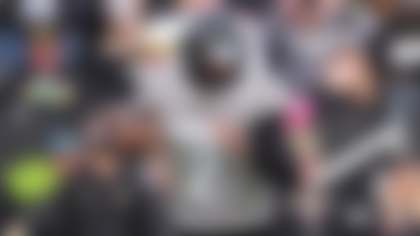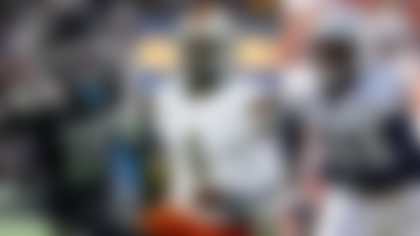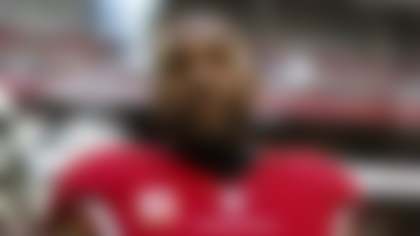It's a not a stretch to say the impact of the hit is still being felt in the NFL today, even 15 years later, and Tom Brady, who witnessed it, remembers being stunned by both its violence and the unforgettable sound of the collision. Ever since New York Jets linebacker Mo Lewis crashed into Drew Bledsoe that day near the Patriots sideline in Foxboro Stadium -- changing the course of NFL history and launching a dynasty -- the reverberations have never really ended.
"It was the loudest hit I could ever remember hearing," Brady said, recalling the events of Sept. 23, 2001, when Bledsoe's late-game injury in Week 2 paved the way for the start of New England's Brady era. "Drew was so tough, and he got up and came to the sideline and his face mask was smashed. I saw and heard the hit, and it was a crushing hit."
Friday marks the 15th anniversary of that unmistakeable pivot point in the Patriots franchise, when Brady and Bledsoe saw the course of their careers changed in an instant. Bledsoe suffered both a concussion and internal bleeding when Lewis slammed into the left side of his chest, enduring a potentially life-threatening situation that night as he sped in an ambulance to Mass General Hospital in Boston.
Bledsoe's injuries opened the door for Brady to play the final 2:16 of the 10-3 loss to the Jets, and though Brady did not save the day for New England in that memorable setting -- the first week the NFL returned to action after the tragedy of 9/11 -- the Patriots have been his team ever since, and his journey to the Hall of Fame truly began with that tumultuous turn of events in the home opener of what became an improbable Super Bowl-winning season in Foxborough. Bledsoe, the No. 1 overall draft pick in 1993, never started another game for New England and was traded to Buffalo the following April.
Both Brady, who is still on a league-mandated four-game suspension owing to the Deflategate saga, and Bledsoe agreed this week to share their reflections and recollections of that momentous game, which gave rise to one of the most dominant teams and most sustained and successful runs in league history.
The Patriots entered that delayed Week 2 game at 0-1, having lost 23-17 on the road to the lowly Bengals in their opener, two days before 9/11. Then came the long two-week break between games, as the nation reeled from the loss of almost 3,000 lives and tried to regain its footing amid the new reality of having experienced multiple acts of terrorism on its home soil.
The scene at Foxboro Stadium before the Jets and Patriots played was a moving one, with pre-game and halftime ceremonies honoring both the 9/11 victims and the heroic first responders who sprang into action that fateful day. For the Patriots, it was especially poignant because guard Joe Andruzzi's three brothers all are New York City firemen who responded to the 9/11 attacks, and Andruzzi led the team on to the field holding an American flag in each hand. His brothers were honored at midfield before kickoff.
Tom Brady: I remember it being a beautiful sunny day and there was so much emotion in the stadium. Joe Andruzzi's brothers were part of the ceremonies, so it meant so much to us as a team. It was very surreal getting back to football, but we also felt a great responsibility to get back to our lives and show the world we were moving forward with great strength.
Drew Bledsoe: It was a pretty crazy time, and football seems fairly small at times like those. But we also recognized that getting back on the field and creating some sense of normalcy for our country was important. For us, and particularly in that situation with the Andruzzi brothers, our proximity to New York, and then also the fact we were playing the Jets, who were coming up from down there, it all added to a great deal of emotion that made things way bigger than just football that day.
When you add in that two of the planes that crashed on 9/11 left from Logan Airport, there was a deep Boston connection. And let's not forget, we're the Patriots. So while there was that sense that football seemed insignificant in the grand scheme of things, we were also important to the country in terms of trying to restore some sense of balance and routine to life.
That routine was hard to reacquire for football players unaccustomed to having an unscheduled break in the regular season, almost immediately after it had begun. As NFL commissioner Paul Tagliabue and other league decision makers debated whether to play the originally scheduled Week 2, Bledsoe recalls having mixed feelings about the issue.
Bledsoe: It was a long wait between games, and I also was involved in some of the conversations with the league to try and decide whether we should play, or whether we shouldn't play. I was on some conference calls that week trying to figure out what the right thing for us to do would be, and ultimately the right decision was made, which was to not play, and put if off for a week before we continued on with the season. So, yeah, there was a lot craziness going on that week and certainly it was very emotional for all of us in our country.
I initially felt like it was important to get back on the field sooner, but as the week progressed, I came to feel like the right thing was to take a week off and to really allow things to settle down. With the enormity of the situation, I think it would have been borderline disrespectful to try to play a football game the week immediately after the tragedy.
The Jets, with rookie head coach Herm Edwards, led 10-3 with just 5:10 remaining, and the Patriots were pinned deep in their own territory on a thid-and-10 at the New England 19. It was on that play that Bledsoe scrambled out of the pocket to his right, heading for the first down marker at the 29, with Jets defensive lineman Shaun Ellis in hot pursuit and nipping at his heels. Bledsoe picked up about 8 yards on the run, before Lewis plowed into him from the left, like a heat-seeking missile, knocking him out of bounds two yards shy of the first down.
Bledsoe: I didn't really see Lewis, because all I saw was the first-down marker. It was third down and while I was running toward the sideline, I couldn't just go out of bounds short of the first-down marker -- not in that situation, late in the game. So I tried to cut back inside and see if I could get the first down, and when I did that, I gave up my body to take the hit.
"People forget that after I got hit, I went back in the game the next series. And the reason why I came out of the game after that series was because I had a concussion, as well, and I didn't know which way was right and which way was left, and didn't know my two-minute plays, which we had run for two years. I didn't know I was seriously hurt until after the game.
Brady: I remember seeing the hit, but I don't remember much just after it. Like I said, Drew was so tough, and it was hard to really understand what was happening at that point.
Patriots head coach Bill Belichick later said he regretted allowing Bledsoe to re-enter the game after the hit by Lewis, because he quickly saw that his ninth-year veteran quarterback wasn't right and in the parlance of football "had had his bell rung." So by the time Brady entered for the first pressurized appearance of his nascent two-year NFL career, only 2:16 remained in the fourth quarter, with New England in possession at its 26 and still trailing by seven. Brady drove the team to three first downs, completing a 21-yard pass to David Patten for the long gain. From the Jets' 29, his final two desperation passes were in the vicinity of the end zone, but went incomplete, and no comeback would be forthcoming against the Patriots' bitter division rival. Brady couldn't have known at the time, but the arc of his career had just been dramatically altered.
Brady: Everything happened so fast and I think I was just reacting to the moment. I felt prepared, and really it felt like football. Like something I had done many times before. I was bummed we lost, because we had some chances at the end. But it wasn't until mid-week when we knew the extent of what Drew was dealing with. Again, I was just taking things as they came, and I tried to make the best of the situation, as it was tough for everybody, with somebody I respected so much, like I did Drew.
Bledsoe didn't know anything other than he felt a bit dazed and groggy from the hit. Initially he just wanted to head to the locker room after the game and then go home. But the seriousness of his situation quickly presented itself.
Bledsoe: After the game, I was headed into the locker room with Ron O'Neil, our trainer, and he said "Why don't you come with me, Bub." He called everybody "Bub." And I said, "No, I'm going to go in for team prayer, and then I'll come see you." And he goes, "Nah, I think you need to come with me, now." So we went in and Bert Zarins, our team doctor is there. He said the thing that really tipped him off that something was really wrong is that normally when you have a concussion, your heart rate starts to slow down pretty quickly. And instead of my heart rate slowing down, mine started to climb pretty dramatically. So that's when he knew we were dealing with something that was more serious.
So they put me in the ambulance and I really don't remember much of that drive in. But my brother, Adam, got in the ambulance with me, and they couldn't give me anything for pain because I'm allergic to morphine.
I don't remember this, but my brother said as we were driving and were just approaching the outskirts of Boston, I just went lights out. I just passed out, just from lack of blood. And he thinks I'm dying and he's screaming at the ambulance drivers to get there, get there, and the next thing I know, I wake up in the hospital, with a tube in my chest that was pumping blood out of my chest, and another tube putting it back in.
"I don't think I really knew how serious everything was for a couple days afterward, but yeah, if our trainer hadn't intervened -- because I just wanted to go home -- and if our team doctor hadn't sent me to the hospital, things could have been really different.
Things were really different for the Patriots going forward after Bledsoe's frightful injury. Brady made his first career start in Week 3, a 44-13 demolition of Peyton Manning and the Colts at home, and the rest is history. New England went 11-3 with Brady at the helm for the remainder of the regular season, won the infamous "Tuck Rule" game against the visiting Raiders in the snow in the divisional-round playoffs, then upset the Steelers in Pittsburgh in the AFC Championship Game, thanks in large part to Bledsoe's superb second-half relief job in place of the injured Brady. It was a small consolation to Bledsoe, the displaced starter, who was back on the bench on Super Bowl Sunday in New Orleans, when the Patriots and Brady stunned the heavily favored Rams 20-17 to win the first of New England's four Lombardi Trophies.
Bledsoe: It did feel good to come back and play in that AFC Championship Game. It did make the whole thing feel a bit better, to at least get back on the field during that run. The only hard part was that I tell people it was like giving a starving man a cracker. You just get a little taste of it, and then I had to go back on the sideline for the Super Bowl.
But the thing that people don't realize about that season -- when I got to training camp and stepped into the huddle for the first time, I really thought we had a shot. For the simple reason being we had an offensive line that was going to be outstanding. The thing I really remember distinctly about coming into that AFC Championship Game was the first couple throws I made, I threw the ball and then I stood there and watched the ball get completed and nobody touched me.
I just remember thinking, OK, this is pretty cool. Chuck the ball, watch it get caught and you don't get hit. So that O-line group really had come together and that's why I believed in training camp that we really had a shot, and that ultimately ended up being the case.
Bledsoe said he never dwells on the twist of fate that day in Foxborough and what it wrought in his career "outside of you guys [the media] calling and bugging me about it." But 15 years later, it's impossible to know how the story in New England would have turned out had Bledsoe not been literally knocked out of the lineup by Lewis' clean but brutal hit. Brady's talent and potential would have carried the day at some point, but when? And where?
Bledsoe:Tom is a guy that always had that amazing work ethic and is a natural leader, but I don't think anybody outside of Tom himself had the impression he was going to ultimately be a long-term starter in the NFL, let alone be a guy considered one of the all-time best.
I felt like he was going to be a guy who was going to be around the league for a long time, and may get a chance to start for somebody somewhere. But ultimately, he ended up having the opportunity to play for the best organization in football, and he grew into it and became a lynchpin for that organization.
But if I hadn't gotten hurt, maybe that doesn't happen. Maybe he ends up with another organization, and winds up helping somebody else out.
Follow Don Banks on Twitter @DonBanks.



